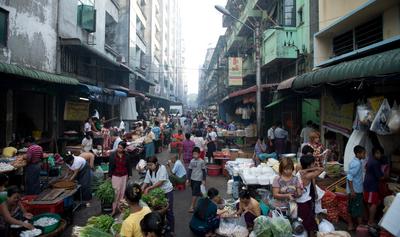Its natural resource and population base provide the foundation for a substantial economy, should it succeed in its ambition for reform and economic development. But Myanmar’s opening has wider implications for development right across the Asian region, positioned as it is as a land bridge between China and India in the middle of Southeast Asia. Myanmar’s coming out to the world opens a geo-economic gateway between East and South Asia and the prospect of a new chapter in Asian development.
Myanmar is currently enjoying a surge in international goodwill, with the practical consequence that renewed access to international trade and resources has dramatically lifted its growth potential. But ultimately Myanmar’s golden promise will depend on what success it has with political and economic reform at home.
While success in both political and economic reform might justifiably be described as mixed thus far — the military maintain a preferred space in the national parliament and their economic ‘cronies’ still have a tight grip on precious national assets and influence on policy — the course has been set. Political survival now depends not on maintaining the status quo ante but rather on clear and measured progress towards political and economic liberalisation.
This achievement is little short of miraculous, a testament to the courage of opposition leader Aung San Suu Kyi and her followers, the leadership of President U Thein Sein and his administration, as well as to the tenacity and faith of the people of Myanmar in the possibility of its deliverance. A reversal of the progress in Myanmar seems unlikely, given what the military leadership now have riding on it, nationally and internationally (as it assumes the chair of ASEAN in 2014), but how bumpy the road ahead is will depend much, if not crucially, on whether political reform can be entrenched through the prosperity that only economic reform can bring.
The good news it there have already been significant economic reforms and more is in the pipeline. Reform of the foreign exchange regime has not only put a more realistic price on the national currency, the kyat, and taken a first big step in getting economic incentives and disciplines right in the Myanmar economy; it also exposes the rip off of national assets that the cronies enjoyed via the wedge between the old official exchange rate and what those assets were worth in international market values. The foreign investment law has been revamped — a huge step forward despite the cronies resisting liberalisation of the foreign investment regime to protect their patch..
In this week’s lead essay, U Myint, one of Myanmar’s most distinguished economists, and chief economic adviser to the President U Thein Sein, points out that foreign investment will, of course, play a critical role in achieving Myanmar’s real growth potential, as it has in China and elsewhere throughout the East and Southeast Asian region. But, he adds, without fundamental reforms in the domestic economy, foreign investment cannot be expected to bring about economic miracles independently of good policy at home.
‘Unless Myanmar’s own policy frameworks are robust and reliable’, writes U Myint, ‘how will foreign investors be persuaded to put confidence, and bring markets, know-how and capital, into the country? Without stable macro-economic policies and policy institutions, an effective taxation regime and soundly based social and capital expenditure programs, why won’t foreign investors choose to go elsewhere? And why would the ordinary people of Myanmar be happy if the benefits of foreign investment are not spread widely via sound fiscal, land, environmental and labour policies and institutions but rather captured narrowly by special dealing and the privileged few’.
As U Myint argues, it will be very difficult to establish quickly the policy and legal frameworks and an environment right across the country in which foreign investors or the people of Myanmar can have immediate and total confidence. That is why other economies, like Singapore, China, Taiwan, Malaysia and Vietnam established special economic zones in which trade could be freed up, legal frameworks established, and infrastructure developed that were beachheads for testing and demonstrating the path to development more broadly. U Myint advocates moving to establish special economic zones in Myanmar near major centres such as Yangon and Mandalay as an urgent national priority. Special economic zones will serve to boost economic growth immediately; though they are, as he says, by no means the end of the process which will only come from extending their benefits across the country.
Myanmar has many problems: in committing to comprehensive economic and political reforms; in managing its fractious minority problems; and in building the human capital that will allow it to complete an enormously difficult and complex process. These are daunting challenges. But, Myanmar’s strategic location and its natural resource wealth give it advantages few countries have. And its place within ASEAN gives it every prospect of coming in from the political and economic cold more quickly than Vietnam was able to after the bitter war with America, not to mention North Korea should it ever come to make the choice for economic change.
With the continued wisdom and courage of its new leadership team and the legacy on which it has been able to draw, there is at least more than an even chance that Myanmar will achieve economic and political transformation more rapidly than have many other countries in the region that have gone before it.
Peter Drysdale is Editor of the East Asia Forum.

